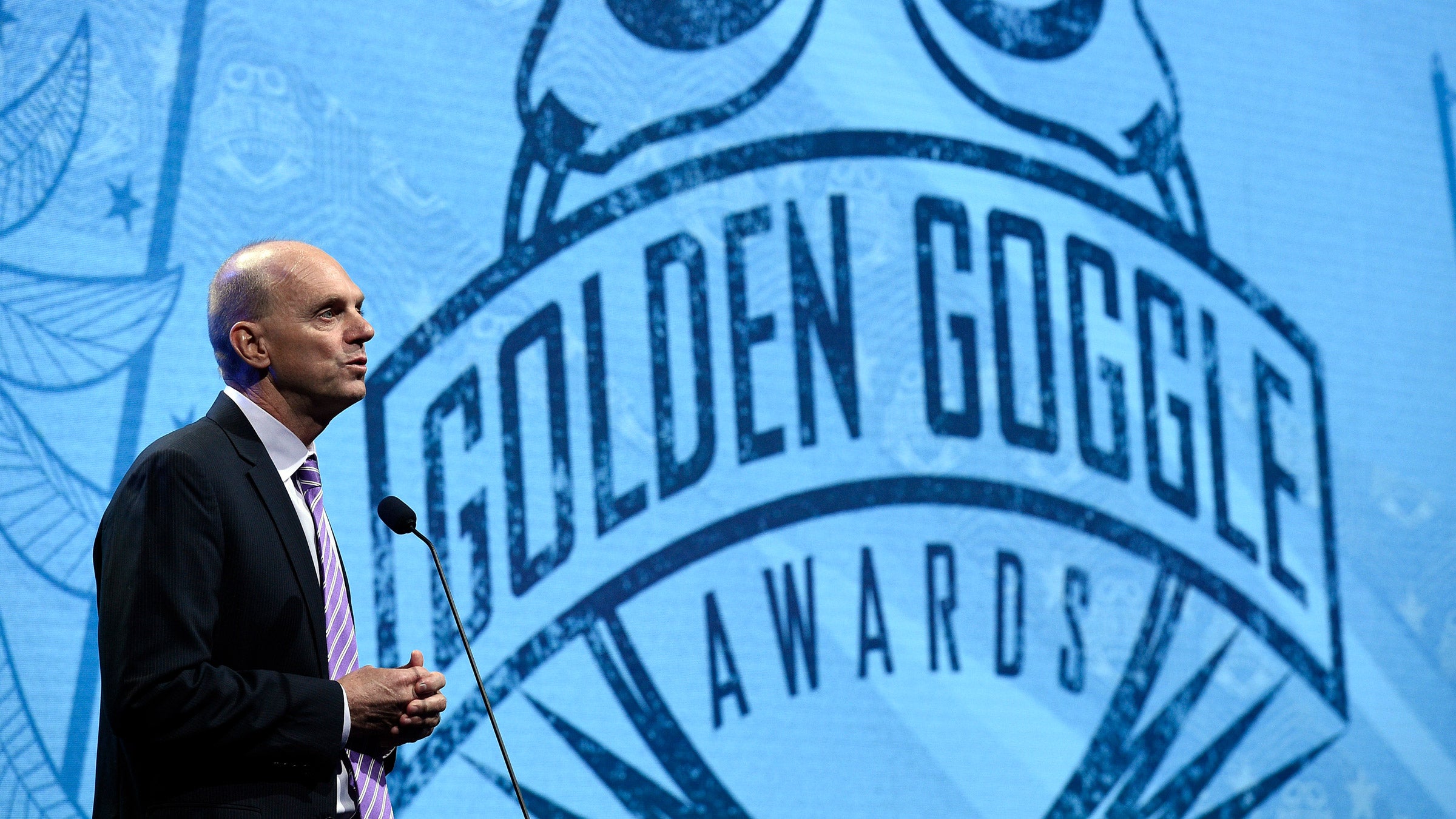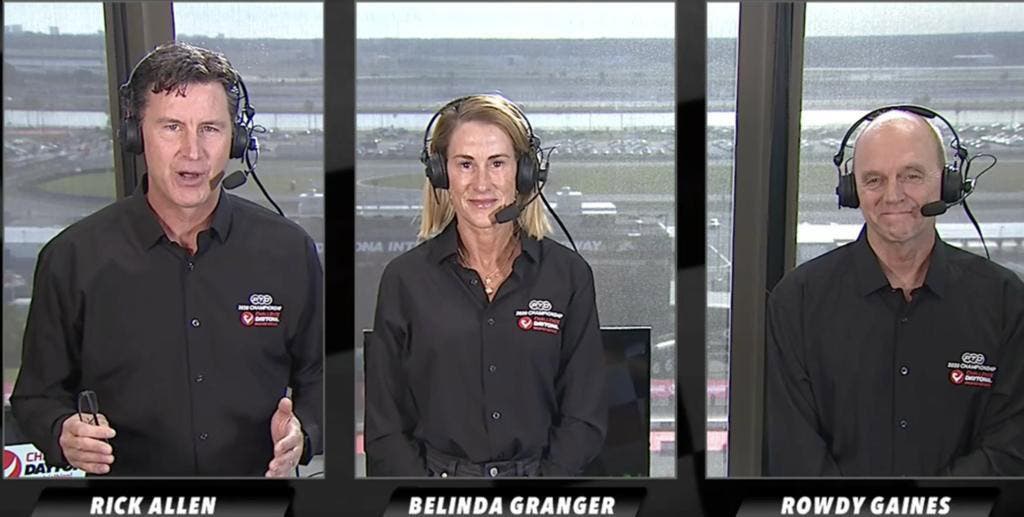Q&A with NBC’s Rowdy Gaines: Daytona, the PTO, and Calling Triathlon Live

(Photo: Kevork Djansezian/Getty Images)
Three-time Olympic gold medalist Rowdy Gaines can talk swimming better than anyone else on earth. If you’ve ever watched Michael Phelps or Katie Ledecky swim, then you’ve heard his animated inflection. This past weekend, his broadcasting talents were on lease to triathlon, as the Professional Triathletes Organization (PTO) brought him and NBC NASCAR host Rick Allen in to join former pro triathlete Belinda Granger in the booth to call the inaugural PTO 2020 Championship at Challenge Daytona.
It was Gaines’ second time working a triathlon broadcast—he was on the call for Escape from Alcatraz three years ago—and while he’ll be the first to tell you he’s no triathlon expert, he did race a few short-course tris while living in Hawaii for eight years, and he’s very aware of the significance of Ironman Hawaii on the international endurance sports stage.

We caught up with Gaines a few days after Daytona to get his take on what went well, what be improved, and what it all means for the future of triathlon on TV.
Triathlete: You were at last year’s Challenge Daytona as a spectator, but what stood out this time around when you got to the venue. Could you sort of feel the significance of the race this year?
Rowdy Gaines: Being a fan but not an expert on triathlon, what felt different to me was the containment of it all. You could eyeball everything right in front of you. It’s not like athletes were 20 miles away and you had no idea what was going on. As a fan—and I could be wrong—I think it could be pretty cool going forward if you could buy a ticket and go inside a stadium and watch an entire event from a seat.
Certain Olympic events, like rowing, triathlon, and marathon, are hard for spectators, because you see an athlete go by and that’s it. It makes it hard to become a fan of the live event. Obviously not every triathlon can provide that, and money is the big issue. Just to turn the lights on at Daytona costs $100,000. But for certain events, I think this race showcased what the live experience can be.
What was the most challenging part about covering a different sport, and how much research do you have to put in ahead of time to get yourself comfortable for the broadcast?
Gaines: Two big things I had to research were the governing body situation and the distances. And of course I had to research the athletes. The only athlete I really knew of was Alistair [Brownlee] because he’s a double Olympic champion. They sent us a book about the athletes a few weeks ago so I could learn some of their back stories. Tim O’Donnell was one who really stood out being a Navy guy and overcoming a big injury in Kona.
Maybe the biggest thing was learning the technical aspects of the sport. From a technical standpoint, I don’t know anything about cycling or running, and I didn’t pretend to. That’s why I was so inquisitive to Belinda. I was basically just asking her questions as a fan. She was awesome and kind of held my hand through the whole thing. I just asked the questions and then let her really get into the technical aspects of the sport. So she was a huge help, as were Kevin [Mackinnon] and Alicia [Kaye] down on the track. I really enjoyed the give and take between them.
The distance was really interesting to me. Not knowing much about the sport, I wasn’t sure why the short- or long-course athletes would be right for it. Belinda explained it to me as a 50-meter swimmer going up to swim the 1,500 and a 10K open-water swimmer coming down to race the 1,500. It was cool to see them meet in the middle. It creates a lot of unpredictability and that’s something fans enjoy watching.
You’ve spent a lot of time this year covering the International Swim League (ISL), which has a lot of similarities to the PTO in terms of where the money is coming from and what they’re trying to do for their respective sports. What are some things ISL is doing well that PTO could learn from, and vice-versa? What do you think ISL could improve upon after seeing what PTO is doing?
Gaines: I certainly think that from a production standpoint, the event in Daytona took things to a new level for triathlon. It all comes down to money. That’s what ISL did different. We had 36 cameras at the ISL final [in Budapest]. At the Olympics, we have 32. They had 14 semi-trucks full of production equipment. Normally, when I do a USA Swimming Pro Swim, they have one truck. It’s a completely different level. Obviously there’s a certain person backing ISL that makes that possible. (Editor’s note: ISL is funded in large part by Russian-Ukrainian billionaire Konstantin Grigorishin, just as the PTO is funded primarily by Welsh billionaire Michael Moritz.)
Swimming, like triathlon, has always been about the clock. To make the clock secondary and to make it more of a point system isn’t necessarily a bad thing. I don’t think risk-taking is a bad thing in sports like swimming or triathlon that really don’t get a lot of love outside of the Olympics—or Kona for triathlon. So raising the production value and focusing on the storytelling is something ISL has done really well, and obviously that’s something that PTO wants to focus on.
I didn’t know much about the Collins Cup before [last weekend], but it sounds like that’s sort of like the team format ISL is doing. Maybe that’s something ISL could learn from the PTO. A team format is really cool, but people watch the Ryder Cup in golf because it’s country vs. country. Maybe that’s something ISL could do in the future, where you have a team USA—or two team USAs—and then a Europe team and a world team or something like that.
How would you grade Belinda Granger’s first time in the broadcast booth and what advice would a veteran like you give her going forward?
Gaines: I don’t know if she just did her homework or if she just knows all this stuff. She had all these notes written down, but I’m not sure if she even looked at them. We’d start talking about an athlete that I’d certainly never heard of—and neither had Rick—and all of a sudden she’d tell their whole story.
As far as advice, I don’t even know if there’s any I can offer. She wasn’t over-bearing. She didn’t talk too much. Listen, it was eight hours of a sport that Rick and I didn’t know much about. She had to talk. There were times we let the race play and we just shut up. As for advice, it’d be the pot calling the kettle black, because I screw up so much it’s hard for me to think I could give advice to anyone.